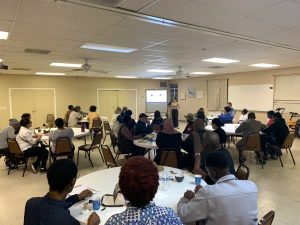This blog post is by Matthew L., Workforce and Economic Development Librarian.
Earlier this year, I attended a meeting organized by Literacy Connects where I met Hannah Johnson from the International Rescue Committee of Tucson (IRC). Hannah works as a micro-enterprise and small business counselor for the IRC serving the refugee population of Tucson. I spoke with Hannah afterwards about the IRC and her work to support our community.
The International Rescue Committee administers resettlement operations, offers medical, housing, and cash assistance through case workers, and provides an employment empowerment program where refugees can get assistance with searching for a job, resume building and interviewing. They provide language translation services for their clients as needed and as they can, to ease the transition for refugees into a new community and culture.
Hannah has spent the past six months building connections with local nonprofits, city, county and state governments, and meeting with a growing list of clients who are looking to start home based or small businesses in Pima County. She helps them navigate the complicated process of getting licenses, bank accounts, certifications and all the detailed steps needed to successfully launch and run a small business.
Refugees begin their small business journey for a variety of reasons. Hannah told me, “For many refugees, this is about capturing the American Dream. It’s a desire to be your own boss and use your skills and abilities to develop an income stream for yourself, but also to help the larger community you are a part of." Hannah has worked with a client who saw the need in the community for a 24-hour daycare and is working to start as a homecare provider. She has also helped one client start a catering business and another to get a cottage food license to sell baklava.
“Starting a business is complicated. My clients have many grand ideas about their business plans and its my job to bring them down and help them slog through the details and do everything required to make their dreams a success.” Food-based businesses can be quite complicated, for instance, as they require a partnership with a commercial kitchen. For catering, mobile food carts, or restaurants in Pima County, a space is needed that can be inspected and Health Department certified. Not to mention the food handling certifications and business license requirements.
“These steps can be discouraging for people. Some of my clients drop their ideas, but some see what’s required as challenges they can face and overcome.” Hannah’s catering client, for instance, now has a website, menu, and online platform for taking orders. They have had tastings where they could showcase their food and are now getting a kitchen in which they can work.
“The most rewarding part of my job is seeing the agency of people develop as I work with them to achieve their goals. It’s not me who does all the things that need to be done. It’s my client. My job is to help them navigate the system and reduce barriers, like language, but ultimately their achievement comes from them.”
Pima County Public Library helps the community by offering small business and nonprofit workshops, available through its Ignite programs, and by referring people to community organizations like the Small Business Development Center, SCORE Southern Arizona, FORGE - University of Arizona, and Startup Tucson.



